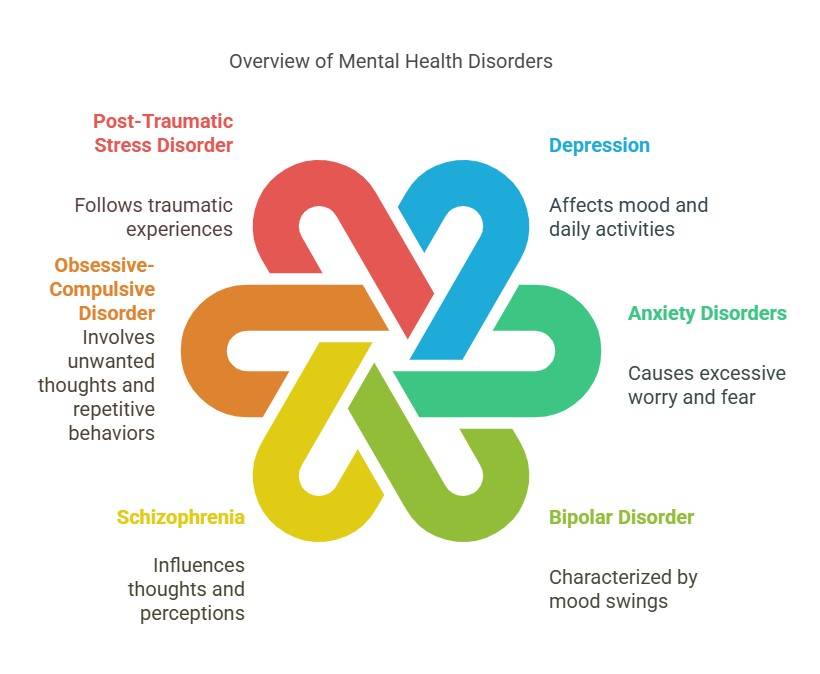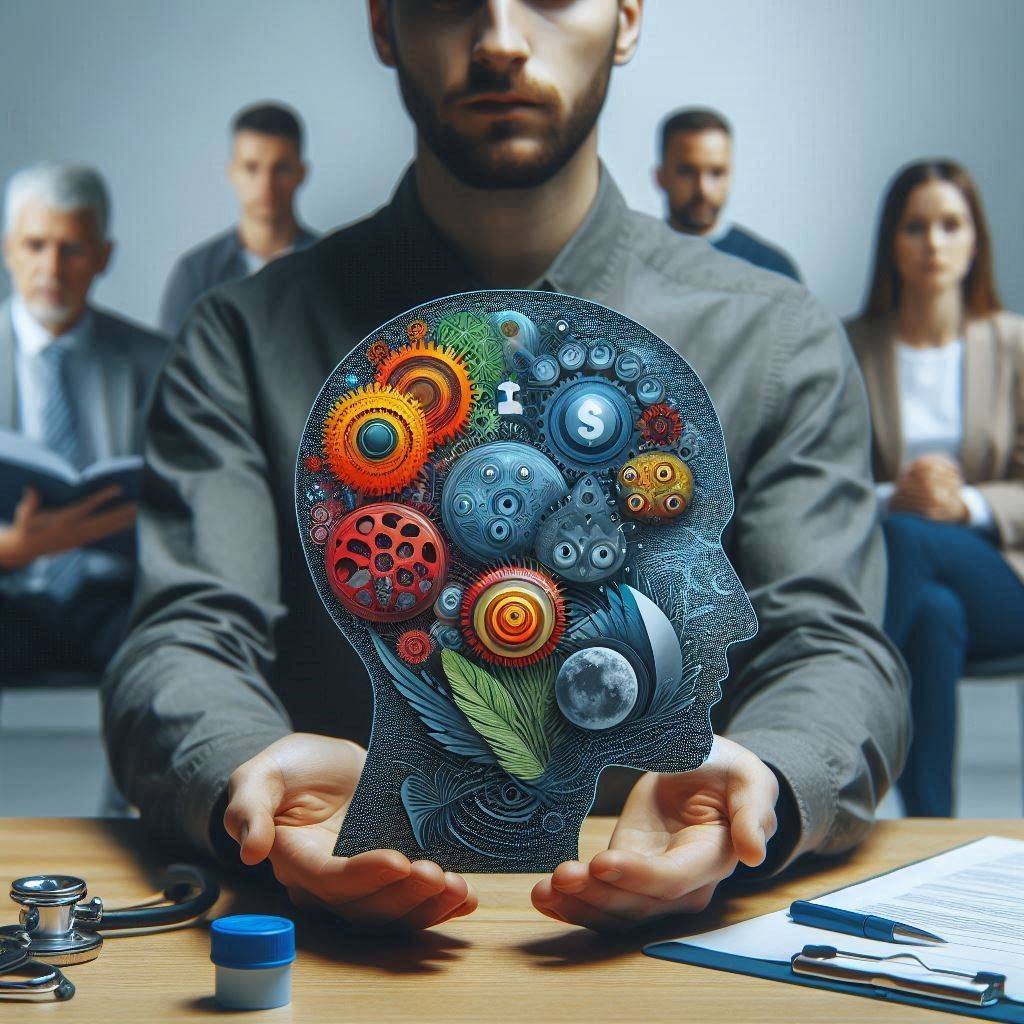Discover the latest expert insights on mental health illnesses and effective treatments. Learn how to recognize symptoms and find support. Get informed now!
Mental health is essential to our overall well-being. From my experience, understanding mental health illnesses can truly improve people’s lives. In this guide, we’ll explore 10 common mental health conditions and their treatments.
What Are Mental Health Illnesses?
Mental health issues impact thoughts, emotions, behaviours, or mood, causing distress and daily life challenges. These conditions are widespread and can affect anyone, regardless of age, gender, or background. Common signs of mental health issues include:
- Persistent sadness or irritability
- Difficulty concentrating or making decisions
- Extreme mood swings
- Altered sleep habits, including excessive sleeping or insomnia.
- Withdrawal from friends, family, or activities
- Unusual thoughts or fears
It’s important to note that mental health illnesses are not a sign of weakness. They are medical conditions that require proper treatment and support.
Types of Mental Health Illnesses

Types of Mental Health Illnesses
1. Depression
Depression is a common mental health disorder that affects how you feel, think, and act.
Symptoms:
- Feeling sad most of the time
- Losing interest in things you used to enjoy
- Changes in appetite or weight
- Trouble sleeping or sleeping too much
- Feeling tired all the time
- Difficulty concentrating
- Thoughts of death or suicide
Treatment:
- Talking to a therapist (psychotherapy)
- Taking medicine called antidepressants
- Making lifestyle changes like exercising and eating healthy
- In severe cases, doctors might use a treatment called electroconvulsive therapy (ECT)
I’ve seen how depression can affect people’s daily lives. It’s important to remember that it’s not just feeling sad, and getting help is crucial.
2. Anxiety Disorders
Anxiety disorders are mental health issues that cause excessive worry, fear, or panic.
Types of Anxiety Disorders:
- Generalized Anxiety Disorder (GAD)
- Panic Disorder
- Social Anxiety Disorder
- Specific Phobias
Symptoms:
- Constant worry
- Feeling restless or on edge
- Trouble focusing
- Sleep problems
- Physical symptoms like a fast heartbeat, sweating or shaking
Treatment:
- Cognitive Behavioral Therapy (CBT)
- Exposure therapy
- Anti-anxiety medications
- Learning relaxation techniques like deep breathing or meditation
I’ve found that many people with anxiety can lead normal lives with the right treatment and support.
Read more about: Can Anxiety Cause Nausea? 5 Surprising Ways It Affects Your Gut
3. Bipolar Disorder
Bipolar disorder is a psychological condition characterized by intense fluctuations in mood.
Symptoms:
- Manic episodes: Feeling very energetic, needing less sleep, and taking risks
- Depressive episodes: Feeling very sad, hopeless, and losing interest in activities
Treatment:
- Mood stabilizer medications
- Antipsychotic medications
- Psychotherapy
- Learning to manage lifestyle and routines
I’ve seen how bipolar disorder can be challenging, but with proper treatment, many people can live fulfilling lives
4. Schizophrenia
Schizophrenia is a serious psychological condition that influences an individual’s thoughts, emotions, and actions.
Symptoms:
- Hallucinations (seeing or hearing things that aren’t there)
- Delusions (false beliefs)
- Disorganized speech
- Lack of motivation
- Social withdrawal
Treatment:
- Antipsychotic medications
- Psychosocial treatments
- Supportive therapy
- Help with work and daily living skills
Schizophrenia can be scary, but I’ve seen how early treatment can make a big difference in managing symptoms.
5. Obsessive-Compulsive Disorder (OCD)
OCD is a mental health condition where people have unwanted thoughts (obsessions) and repeat certain behaviours (compulsions).
Symptoms:
- Intrusive, unwanted thoughts that won’t go away
- Repeating actions or mental acts to reduce anxiety
- These thoughts and actions interfere with daily life
Treatment:
- Exposure and Response Prevention (ERP) therapy
- Cognitive Behavioral Therapy (CBT)
- Medications called SSRIs
I’ve found that many people with OCD can learn to manage their symptoms and lead normal lives with the right help.
6. Post-Traumatic Stress Disorder (PTSD)
PTSD is a mental health issue that can happen after experiencing or witnessing a traumatic event.
Symptoms:
- Flashbacks or nightmares about the trauma
- Avoiding things that remind you of the trauma
- Negative changes in thoughts and mood
- Being easily startled or always on edge
Treatment:
- Trauma-focused psychotherapy
- Eye Movement Desensitization and Reprocessing (EMDR)
- Medications for depression or anxiety
I’ve seen how PTSD can affect people from all walks of life, and it’s important to know that help is available.
7. Eating Disorders
Eating disorders are serious mental health conditions that involve extreme emotions, attitudes, and behaviours related to food and weight.
Types of Eating Disorders:
- Anorexia Nervosa
- Bulimia Nervosa
- Binge Eating Disorder
Symptoms:
- Extreme restriction of food
- Binge eating
- Purging behaviours (like vomiting or excessive exercise)
- Distorted body image
Treatment:
- Nutritional counseling
- Psychotherapy (like CBT or family-based therapy)
- Medications for related conditions
- Medical monitoring
I’ve found that early intervention is key in treating eating disorders and preventing serious health complications.
8. Attention-Deficit/Hyperactivity Disorder (ADHD)
ADHD is a mental health disorder that affects attention, hyperactivity, and impulsiveness.
Symptoms:
- Trouble focusing
- Being easily distracted
- Hyperactivity (always being “on the go”)
- Acting blindly
Treatment:
- Behavioural therapy
- Medications (stimulants or non-stimulants)
- Educational support
- Learning organizational skills
I’ve seen how proper treatment can help people with ADHD succeed in school, work, and relationships
9. Borderline Personality Disorder (BPD)
BPD is a mental health condition characterized by unstable moods, behaviour, and relationships.
Symptoms:
- Intense, unstable emotions
- Impulsive behaviors
- Unstable relationships
- Fear of abandonment
- Chronic feelings of emptiness
Treatment:
- Dialectical Behavior Therapy (DBT)
- Mentalization-Based Therapy (MBT)
- Medications for specific symptoms
I’ve found that with proper treatment and support, many people with BPD can learn to manage their symptoms effectively.
10. Substance Use Disorders
Substance use disorders are mental health issues involving the misuse of alcohol, drugs, or other substances.
Symptoms:
- Unable to control substance use
- Continued use despite negative consequences
- Withdrawal symptoms when not using
- Neglecting responsibilities and relationships
Treatment:
- Detoxification (if needed)
- Behavioural therapies (like CBT)
- Support groups (like Alcoholics Anonymous)
- Medications to help with addiction
I’ve seen how substance use disorders can affect not just the individual, but their entire family and community. With the appropriate care and assistance, recovery is achievable.
Seeking Help for Mental Health Illnesses
If you think you or someone you know might have a mental health condition, it’s important to get help. Here’s what you can do:
- Talk to your doctor
- See a mental health professional (like a psychiatrist or therapist)
- Call a mental health helpline for advice
- Join a support group
Remember, getting help with mental health issues is a sign of strength, not weakness.
How can mental health illnesses impact work productivity?
Mental health illnesses can significantly impact work productivity in various ways:
- Reduced focus and concentration: Conditions like depression, anxiety, and ADHD can make it difficult for employees to concentrate on tasks, leading to decreased productivity
- Increased absenteeism: Mental health issues often result in more sick days and time off work. A study by the World Health Organization found that depression and anxiety disorders cost the global economy an estimated $1 trillion in lost productivity each year because of absenteeism.
- Presenteeism: This refers to employees being physically present at work but not fully functioning because of mental health issues. Presenteeism can lead to slower work pace, lower quality of work, and more mistakes.
- Impaired decision-making: Mental health conditions can affect cognitive performance, leading to poor decision-making and problem-solving abilities
- Communication breakdown: Mental health issues can negatively impact interpersonal relationships and team dynamics, leading to communication problems and reduced collaboration
- Decreased creativity: Poor mental health can stifle creativity and innovation, which are crucial for many businesses to remain competitive
- Higher turnover rates: Employees with unaddressed mental health issues are more likely to leave their jobs, resulting in increased costs for recruitment and training
- Overall productivity loss: Research has consistently shown a strong association between the severity of mental health symptoms (particularly depression) and overall work productivity loss
- Increased workplace accidents: Mental health conditions can affect attention and judgment, leading to more workplace accidents or errors.
- Economic impact: The total cost of lost productivity because of mental health issues is substantial. For example, untreated mental health conditions cost U.S. businesses $47.6 billion in lost productivity annually.
Employers need to recognize these effects and implement strategies to support employee mental health. This can include providing access to mental health resources, creating a supportive work environment, offering flexible work arrangements, and promoting a balance of work-life. By prioritizing mental health, companies can improve productivity, retain talent, and create a more positive workplace culture.
FAQs about Mental Health Illnesses
What are the most common mental health disorders?
The most common mental health issues include depression, anxiety disorders, bipolar disorders, and substance use disorders.
Can mental health conditions be cured?
While many mental health conditions can’t be “cured” in the traditional sense, they can be effectively managed with proper treatment.
How do I know if I need help with a mental health problem?
If your thoughts, feelings, or behaviours are interfering with your daily life, relationships, or work, it might be time to seek help.
Are mental health disorders genetic?
Some mental health conditions have a genetic component, but environmental factors also play a big role.
Can lifestyle changes help with mental health?
Yes, healthy habits like regular exercise, sleep, and a balanced diet can significantly improve mental health.
Conclusion
Understanding Mental Health Illnesses is crucial for everyone. These conditions are common and treatable. With the right help, many people with mental health conditions can lead happy, productive lives.
I’ve seen firsthand how proper treatment and support can make a vast difference. If you’re struggling, don’t hesitate to reach out for help. There’s no shame in taking care of your mental health – it’s just as important as your physical health. [Note: This conclusion reinforces the key message of the article and encourages readers to prioritize their mental health.]
Reference
- National Institute of Mental Health (NIMH):
- Website: https://www.nimh.nih.gov/
- This reputable organization provides extensive information on various mental health illnesses, their symptoms, treatment options, and research advancements.
- World Health Organization (WHO):
- Website: https://www.who.int/mental_health/en/
- WHO offers valuable resources on global mental health, including information on mental health disorders, policies, and strategies for improving mental health care.

Adel Galal is a health and wellness writer with over 30 years of experience studying and writing about health, fitness, nutrition, and healthy living. He is the founder of NextFitLife.com, where he shares practical, evidence-based guidance to support long-term health at any age. Adel’s mission is simple:
to help people make smarter health choices that fit real life, at any age.



